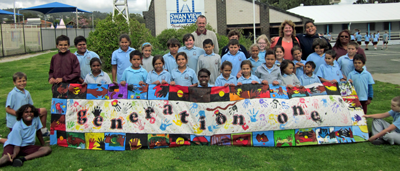8. Swan
Three primary school situated in the eastern suburbs of Perth make up the Swan Cluster.
- Culunga, an independent Aboriginal school was the Cluster Key School for 2009-2011 as the school closed down in 2011
- Moorditj Noongar Community College, a government Aboriginal school
- Swan View Primary School is a government school (link to external site) and was the Cluster Key School for 2011-2012.
| School | Controlling body | Indigenous enrolment | Non-Indigenous enrolment | Number of classes |
| Culunga | Independent school board | 48 | 0 | 2 |
| Moorditj | WA Education Department | 130 | 1 | 7 |
| Swan View | WA Education Department | 50 | 370 | 17 |
Table S1: Statistics of participating schools in the Cluster.
The schools were purposely chosen as they are of differing types and have different constituent populations. Each school considered factors impacting on mathematics outcomes for its children and planned actions that would aspire to improve those outcomes. Hence the initial plans which form the basis of the project varied from school to school. The plans were designed by key members of each school community - the principal, teachers, schools board members - in collaboration with the researchers who assumed the role of Critical Friends. During the project, an outreach strategy from the Cluster involved Midvale PS and Middle Swan PS.
Click to download a paper (PDF 143kB) by the Cluster Critical Friends, Dr Chris Hurst and Professor Len Sparrow, about the Cluster.
Cluster focus
How can we improve mathematical outcomes for urban Indigenous children in the Swan Valley Cluster?
Cluster findings
These Make it Count Cluster Findings have been aligned with the Australian Professional Standards for Teaching. Many of the findings derive from Significant Episodes for educators. Find out about the cluster's intentions and the important stories its educators - their Signficant Episodes - that impacted their teaching.
Units of learning
These units of learning have been designed by teachers. They give insights into creative and innovative ways of teaching mathematics that engages Indigenous (and non-Indigenous) learners.
Inspiring stories
These stories – from the clusters, from educators, Aboriginal students, leaders and parents – tell their journeys, challenges, successes and will inspire educators. They will help you think about your own experiences in the classroom, school and community and inform your teaching.

